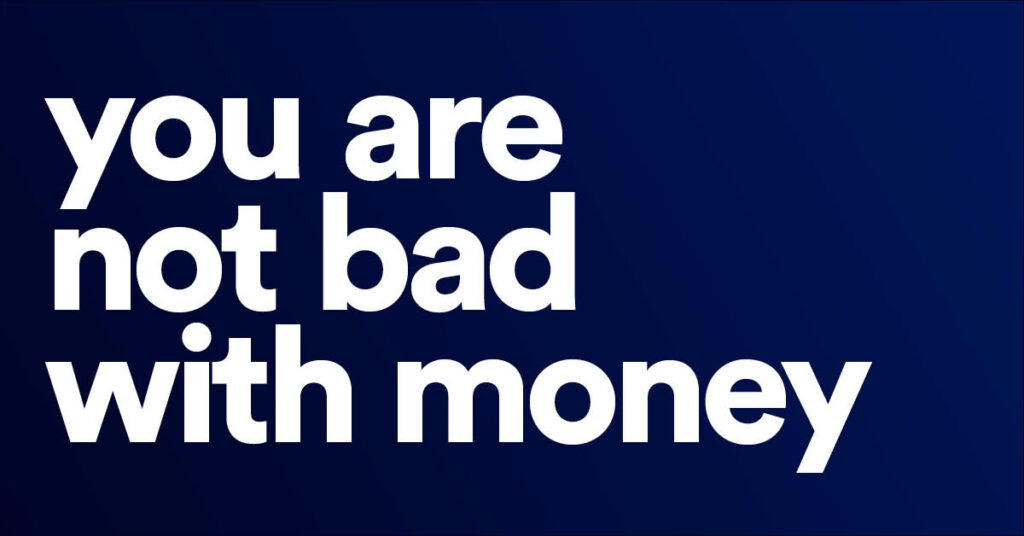Each of us has some level of limiting beliefs. That’s normal. And of course, many of these are based on truths or facts. There are many reasons why I’ll never be onstage at the Devenish for example. But for the most part, the thoughts we have are nothing more than a self-defeating mindset.
“Oh, I’m just bad with money. I always have been”
I’ve heard this comment or one like it, almost daily for the past year. And I’m going to be completely honest with you. For the most part, you’re wrong. No matter how much you say or even believe it, you are not bad with money.
Why People Say They’re Bad with Money
Your past does not define the future
Every single one of us has made financial decisions we regretted later. Some of us have paid with credit we can’t afford and for a few, the level of debt they hold becomes a problem.
However the vast majority will manage their budget and even if it starts to become problematic, they use methods such as the Debt Snowball or Debt Avalanche to pay it down. This often comes with a personal agreement to never get into financial trouble again.
Right now, if you choose so, you can decide to be better with your finances. Will you be perfect? Absolutely not. Will it be a struggle or a challenge? Of course it will. But you can be better with your money starting with the next financial decision you make.
So let’s agree, you and I, person to person, that your mindset shift to being good with money starts now. It starts with the next purchase. Skip that takeaway coffee or cancel the next subscription that renews. And I’m sorry (not sorry), but if you were about to put that holiday to Malaga on your credit card, you cannot afford it, no matter how much you need it.
And this highlights something even more important.
Instant gratification
The underlying factor of being bad with money is not spending money. It’s spending money you can’t afford on things you think you need, trying to impress people you don’t really like.
The greatest single piece of financial advice I was given as a child, is that you only buy things you can pay for in cash. If you can’t afford something, you save up for it. Yet today in the world of “instant gratification, buy now pay later” that we live in, you can purchase almost anything right this second, regardless of whether or not you can afford it.
And this is compounded when you look around you and see people driving the latest cars, on endless holidays and generally just being the Joneses.
This lifestyle, one that should financially be beyond the reach of most of us becomes a necessity and then it becomes the norm. Because each of us works hard and we believe we deserve nice things. And I agree that you do. As long as you can afford it.
Lack of financial education
Many people were never taught about personal finance growing up. Many of the influences we had taught us many negative money habits and provided a less-than-positive understanding of finance. This is not your fault.
How many of you truly understand debt, interest rates, saving rates and your pension? I talk about money every day and I don’t have everything figured out. And yet, a lack of knowledge about money can lead to incorrect financial choices at worst or financial stress at the very best.
The thing is, there are only positives to educating yourself about finance and with this knowledge, you’ll be armed with the information and insights to become much better at managing it.
Now I am completely respectful that right now we’re in a cost-of-living crisis and that many people who are reading this article are struggling with their finances. Some of the factors I have mentioned will be completely out of your control.
But many will be within your influence and let me tell you, you are never too late. There is always the opportunity to make the changes you need and become better with money.
How to Counter the “I’m Bad with Money” Mindset
Being intentional about your money and focusing on the right financial decision happens one step at a time. Most of what I’m about to say is common sense and you’ll already know most of it.
I’ve no doubt you’ll be nodding along with me and if not, please do let me know in the comments.
Hands up if you know you should eat healthy foods and exercise more. Keep your hands up if you know you should save a little bit of your income each month. Of course, everyone knows what they should be doing, but until someone reminds us or a life event happens, we rarely take control.
Consider this your reminder!
Planning for your future
Rather than always worrying about the present, I want you to think about your future. None of us will live forever, but do you want to be working in your 80s because you can’t afford to retire? Sadly that will be the reality for many of those who don’t save enough for retirement.
If we reframe planning for the future, this becomes the reason why we want to become better with our money.
Maybe you hope to have children or you want to move to a bigger home one day. Maybe you want to retire comfortably in the knowledge that you have enough.
And this is important. Because to be better with money, our why needs to be a greater reason than whatever you’ve been spending your money on now.
I love the quote by Kate Moss. Nothing tastes like skinny feels. And look at me. I like cake, so I appreciate no one gets it right all the time. But if I bring this back to money for just a second, putting your money into paying down debt, paying off your mortgage or even into your investments will have a bigger impact on your life than a holiday this summer or a luxury new car.
The difference is that you have to wait for the gratification. Yes, it would be nice driving out of the showroom today, and yes putting the money beyond your reach for 5, 10 or 20 years can feel like a lifetime.
Yet as someone who has done just this and is now in a better financial position for doing so, I can tell you that it is entirely worth it.
Creating a budget
The cornerstone of any financial plan is a budget. Yet out of the thousands of people I speak to, a handful of people have created a household budget.
I guarantee that those of you who say you know how much you spend will be shocked by the true figure that leaves your pocket each month. And it’s never on the lower side either.
I’d one friend tell me that their household never spends over £3,000 per month. When they reviewed their monthly spending and included holidays, exceptional spending or annual payments such as insurance, it was closer to £5,000.
Creating a budget is as simple as listing all of your household income and expected expenses in a spreadsheet. Using this month’s bank statements, you’ll get a pretty good picture of what your household spending is. Generally, a budget is forward-looking. It’s what you plan to spend next month, not what you spent last month. But the quickest and easiest way to understand your money now is to look at last month’s spending.
After listing your income, detail out all of your expenses. If the value you spent is greater than your income, you need to take immediate action. Consider how can you cut costs and where can you reduce any of the amount you spend.
One of the easiest and most common ways to budget your money is to use the 50/30/20 budgeting method.
50% on essential expenses – Food, utilities and your mortgage or rent
30% on wants – Treats, holidays, clothing, takeaways, and subscriptions
20% Saving – Investing or paying down debt
This is just guidance and your budget will never neatly fit into the above percentages. But close enough is good enough. If you’re saving 18% each month that’s massive. But if you’re starting at zero or less, that’s okay also. But you will have work to do.
Understand the true cost of spending
Always start with the easy wins. Yes, it’s cliche to say that you need to cut out the takeaway coffees, but there’s a stack of truth in it. A coffee at 10 am and a lunch from a deli can run you £40 a week or £2,000 a year. If you smoke 20 a day, this can cost you over £5,000 a year.
And this is after-tax money. If you’re on £25,000 a year and you spend £500 a month or £6,000 a year of post-tax money on a new car for example, you’re working over 10 weeks a year to pay only for the cost of the car. This is before tax, insurance, petrol and parking. Thats nuts.
And I’ll show you the method I used to consider how much something costs over its lifetime.
Let’s take a Sky TV package for example. Today an average package with sports and whatnot could easily cost you £100 a month. If you cancel Sky and put that money into your investments, then over the next 20 years with an 8% return, you could have £59,394.72.
In fact, here is a proper real-world discussion a friend of mine talked to me about today. He’s in the market for a new car and the deposit is £10,000 and his monthly budget is £1000 a month. Which is healthy and puts a lot of prestige cars in his price range. My first question is always, do you need that level of car? And 99 times out of 100, the answer will be no. It’s a Joneses thing in reality. He won’t be keeping up with them. He’ll be them.
After discussing this at length, we took his car budget down to the £5,000 deposit and £500 a month. At this level, he’ll still get an incredibly nice car that will fully meet his needs. The other £5000 and £500 per month is going straight into his pension. At 41, he has another 26 years until retirement and if I do some quick maths, when he comes to retire, he’ll be £560,952.56 richer. Over half a million richer and without a single negative effect on the quality of his life.
Educate yourself
At the start of this article, I said that it’s not your fault that you weren’t taught about money. That’s true. But I’d argue that now, continuing to not educate yourself about this topic is entirely your fault. There are thousands of free resources available online and offline.
It’s a shameless plug, but I’ve over 150 articles here on foundered.co.uk and 100 videos on my YouTube channel dedicated to helping you earn more, save more, invest wisely and hopefully retire early.
When I left university I thought I was done learning. It was only a few years later that I realised, I was only getting started.
If you’re struggling with your finances, it’s important to remember that you’re one good decision away from making positive changes. And with every further positive choice, you move closer to the good with the money camp. Hopefully, this article helps to motivate you and improve your understanding about money and if you have any questions, please get in touch with me on my instagram.


